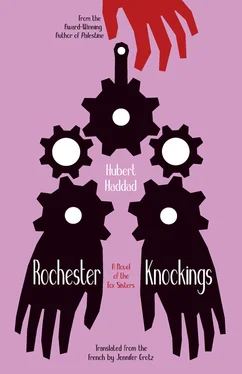“Oh, I’m so happy!” Kate cried out from far enough away to allow her chaperone time to regain composure.
“And by what good fortune?” stammered Miss Helen, gathering up her skirts.
“I spoke with Emerson, imagine that!”
While the good woman showed her ignorance with a dignified silence, Kate went on to recite with pressing eloquence:
Far or forgot to me is near;
Shadow and sunlight are the same;
The vanished gods to me appear;
And one to me are shame and fame.
Tread softly because you tread on my dreams.
— William Butler Yeats
As a consequence of the election of Abraham Lincoln, who promised the abolition of slavery left in abeyance since the 1820 Missouri Compromise, South Carolina’s secession precipitated a national divide in a matter of weeks. In New York as in Rochester, one watched with a sort of stupefied amazement the escalation of events that could only mean a general uprising was on the horizon.
No one had yet experienced the battle of Bull Run, in July 1861—three months after the overall benign confrontation at Fort Sumter at the origin of hostilities — but it was definitely war. Convinced of the superiority of the Loyalists and even more of the efficacy of industry at the Union’s service, the brand new Republican President flanked by two young telegraphists launching his orders, firmly incited a staff of armed forces hardly familiar with such grand military maneuvers.
It all began with disappointment. In position after an exhausting night march, it was in front of the political and financial elite of Washington, come to watch on lawn chairs the announced defeat of the rebels, that the Yankee troops led by General Irwin McDowell surrounded, not without panache, the area of Bull Run. But the skirmish at Blackburn’s Ford improvised by senior officer James Longstreet quickly turned into a fiasco, with a hundred killed and more wounded. After some uncertain exchanges with swords drawn, the Confederate Generals Beauregard and Johnston, veterans of the Mexican War, supported by the Virginia brigade of Colonel Thomas J. Jackson, under the imperious command of Generalissimo Robert E. Lee, rushed in to defeat the enemy camps, tearing off the foot of an eighty-year old widow who couldn’t leave her bed in the process. All of this happened over the course of a few hours around a hill and a stone bridge. Following this panicked start that had had the worst outcome, McDowell’s undermined forces retreated to the outskirts of the capital, on the other side of the Potomac, leaving a crowd of prisoners behind. At the Executive Mansion in Washington, which had just missed falling into enemy hands in this first real battle, it was clear that the war was just beginning and would require important sacrifices in material and in men. The subject of riots in New York, a presidential decree soon launched the mobilization of half a million citizens. Hardly a year later, there were victims in the tens of thousands on both sides of the fluctuating line of the front.
The missionary Alexander Cruik, who had volunteered as a chaplain in spite of being banished by his congregation for his measured defense of spiritualism, experienced hell every day on the front lines and in the country hospitals, where young men’s limbs were being amputated, having been shattered by bullets coming from grooved musket barrels, the recent invention of a French gunsmith. In the middle of pitched battles, even at the risk of being taken as a target, the evangelist wandered like a harvester of souls in the bloody fields where the dying moaned, wandering from a Southerner with a blown-open stomach to a dismembered Unionist. Obsessed by the abomination of mass murder without offense or insult, he saw the disadvantages and defeats of his side facing the Confederates, who were inferior in number but fiercely defending their territory under the banner of aristocratic officers. When Lincoln had resumed the offensive by proclaiming the emancipation of slaves long before the hour of victory, thereby increasing the war effort tenfold through the mass conscription of Blacks and the intensive use of rail and water transport of troops, the horror of the battlefield also found itself multiplied. Armed only with his faith, carrying only his word or his silence, Alexander Cruik could no longer tell what was at stake in all this carnage. How could he find any difference between a massacre displaying Yankee prowess and a mass grave in honor of a generalissimo? In the snow or the mud, uniforms were too torn and stained to recognize which side they belonged to. Therefore, between two dying adolescents, was it necessary to tend to one first before the other? Were their souls brothers or enemies at the moment their armor of passions and identities dropped away?
During the move from one position to another, with the cavalry and artillery wagons preceding the advancing infantry battalions, the wounded at the back letting out cries and moans, Alexander Cruik believed he was watching the dead walking in dense rows and kept hearing the wild screams from the attacks. They all called for their mothers, those who fell. Children were playing at killing each other and believed they were only playing. At Chancellorsville, after four days of shelling and bayonets, the army of the Potomac suffered such setbacks that Cruik saw a band of defeated Yankees lynch one of their own because he was black and therefore the cause of the war. General Robert Edward Lee, in triumph, then pushed his cavalry of apocalypse up to Pennsylvania. Uninformed by the military advisors, the disoriented infantrymen grasped little of these advances and setbacks, other than from the hoarseness of the bugles after the fighting.
Cruik, who had witnessed the consolidation of the North under the leadership of General Grant, no longer reacted as he watched the Confederate troops, now on the offensive, plow the front line with artillery between two hills south of Gettysburg. Considering the sky-blue uniforms of those on the lookout, he couldn’t help but speculate on the survival or imminent death of such and such recruit nearby who, for the moment, was squinting his eyes at the enigma of the horizon, one of them gently touching his ear and the other smiling at some dreamed-of face — all of them on the edge of the abyss, so full of slender eternities.
But there was a shudder, and sighs spread out at the sight of those enigmatic flickers quickly surrounding Little Round Top, countless, on the front line of enemy guns. Rather than giving command to use the artillery, head of the Maine regiment Colonel Chamberlain and his counterparts from New York State ordered their troops to charge. Hidden behind the 48- and 64-pound howitzers, which had been shipped to them by rail and which the bomb blasters surveyed with a rogue tenderness, Alexander had the feeling he was participating by his trembling in every limb at the immense devastation being committed, from this distance similar to a game of colored figurines. A great clamor swept by winds from the west swirled through the hills, where muskets and repeating rifles crackled while artillery sporadically thundered with a kind of phlegm. Already, stretcher-bearers on duty and fellow soldiers brought back the first of the torn-up to the tents. From his point of view overlooking the hills, Alexander discovered beyond this monstrous duel of bayonets, a multitude of other engagements as far as the eye could see, where cavalry and footmen were intertwined in dust raised from the force of their impacts. Called in by a nurse, her arms red with blood, he entered the ward of the field hospital, the odor of chloroform and entrails seizing his throat. At the bedside of a mortally wounded Negro calling for Christ’s help, he began to entreat the unknown powers to come to his aid. Astonished on the brink of his dying, the man had the time to tell him, vomiting his guts, that he wanted only for his name, Ben Crosby, to be written on a piece of paper and pinned to his shirt. Seeing him do that, a wounded man in a bed nearby, who was about to be amputated, asked the same favor in a low voice, adding the name of his village. “Gangrene will set in,” he said, “and I will only get the common grave.” A young woman in a smock who was assisting the surgeon at work on another pallet had turned toward him a worried face, of a feverish beauty. He smiled at her desperately and rushed out of the tent.
Читать дальше












